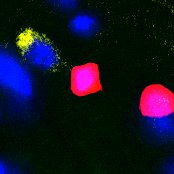Authors: Fanny Martinez, Coline Cotineau, Julien Novarino, Cyrielle Bories, Louis Culie, Stephane Rodriguez, Corine Pérals, Simon Lachambre, Valérie Duplan-Eche, Florence Bucciarelli, Béatrice Pignolet, Roland S. Liblau, Laure Michel, Meryem Aloulou*#, Nicolas Fazilleau*#
When immune processes go awry in the brain, they trigger neuroinflammation, a key driver of multiple sclerosis (MS) and other autoimmune diseases. While the cooperation between T cells and B cells in MS has been well established, the exact role of follicular regulatory T cells (Tfr cells) in this process has remained unclear. Tfr cells are known to regulate immune responses in lymphoid tissues, usually by restraining excessive antibody production. But whether they act as protectors or promoters of neuroinflammation has been an open question.
Researchers at Infinity (Toulouse Institute for Infectious and Inflammatory Diseases) have recently discovered that, contrary to expectations, Tfr cells can actually promote autoimmune neuroinflammation. In patients with MS, higher levels of circulating Tfr cells were observed during relapse compared with remission. Using experimental models, researchers found that mice lacking Tfr cells developed a milder form of autoimmune encephalomyelitis (the mouse model of MS). This protection was linked to fewer B cells infiltrating the brain and less inflammatory activity from T cells.
The study also uncovered a molecular mechanism behind this effect. In the absence of Tfr cells, B cells expressed higher levels of S1PR2, a receptor that normally keeps them confined within lymphoid tissues. Without this control, Tfr cells appear to facilitate the migration of activated B cells into the brain, where they can reactivate pathogenic T cells and drive disease relapses.
These findings provide a new perspective on MS pathogenesis. Instead of acting only as suppressors of harmful immune reactions, Tfr cells may actively contribute to relapses by enabling B cell-mediated neuroinflammation. Measuring their frequency in the blood could help predict disease activity, and targeting their activity might open new therapeutic avenues.
This work, published in Science Translational Medicine, was lead by Meryem Aloulou and Nicolas Fazilleau, in collaboration with neurologists.
link to the publication;https://www.science.org/doi/10.1126/scitranslmed.ady1268

